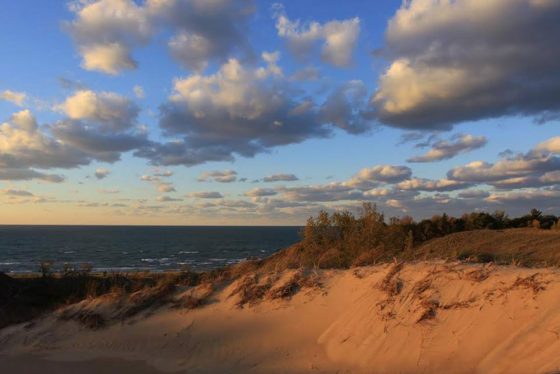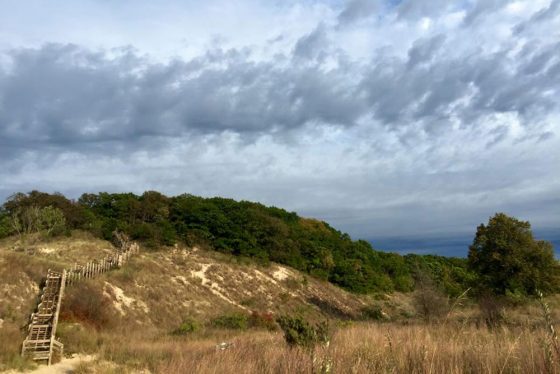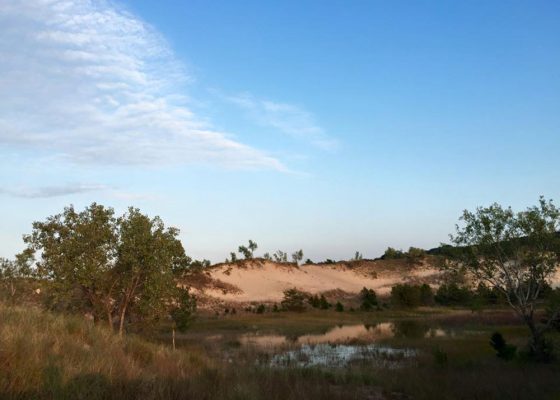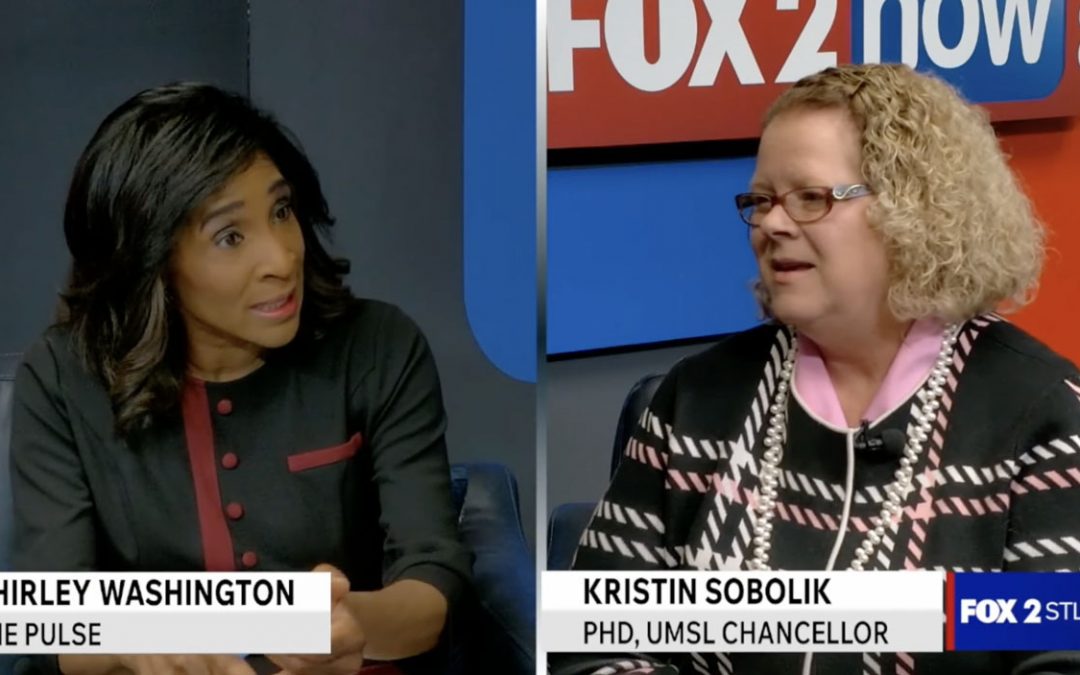
On Jan. 9, UMSL alumna Natalie Johnson will start as the new executive director of Save the Dunes, Indiana’s oldest environmental protection organization. She’s applying her wisdom from her dual UMSL degrees in biology and education to preserve the state’s unique dune landscape and Lake Michigan shore. (Photo by Matt Cunningham)
“Once you see this breathtaking landscape, it becomes part of you,” said Natalie Johnson of the Indiana dunes and Northwest Indiana’s Lake Michigan Watershed. It wasn’t long ago that she climbed Mount Baldy to take in the bursts of green trees, rolling sands and lakeshore.
The task of protecting that landscape has fallen on the shoulders of the University of Missouri–St. Louis alumna. Last month she was named executive director of Save the Dunes, the oldest environmental organization in Indiana. It focuses on the protection of the dunes, lakeshore and all natural resources in the area.
“The habitat that lies among industries and nestled communities is truly one of a kind,” said Johnson. “Not only is it a globally rare habitat, but it also tells an amazing story of human and nature’s co-existence.”
In the early 1900s the dunes were threatened by sprawling suburbs of Chicago and Northwest Indiana. Save the Dunes pushed for the preservation of the land, eventually having their efforts recognized locally with the establishment of Indiana Dunes State Park in the 1920s. It wasn’t until 1966 that the shore area gained protection as well, when along with the dunes the area was declared a national park and named Indiana Dunes National Lakeshore. But much work continues to be done to protect the landscape from more than people.
“Threats include invasive species, climate change, water quality threats such as E. coli in addition to the pressures of urbanization,” Johnson said.
That’s where her dual UMSL degrees in biology and education come in handy. As new executive director, Johnson’s excited to put to work the environmental knowledge she couples with educational strategies to help preserve the Indiana dunes and lakeshore.
“I firmly believe that the first line of defense against these threats is an informed and caring community,” she said. “I’m looking forward to involving many people who live, work or play in northwest Indiana, ultimately connecting them to the dunes and to the actions they can take to further protect them.”
Johnson graduated from UMSL in 2009. She transferred from Lewis and Clark Community College in Godfrey, Illinois, after receiving the Chancellor’s Transfer Scholarship of $3,500 a year. She grew up in Fieldon, Illinois, and touts the Metropolitan Rate Program, which allowed her to pay in-state tuition at UMSL because she lived in one of the 22 Illinois counties included in the program.
It was back in those Illinois days that Johnson recalls her first inklings of loving the outdoors. She “did a lot of growing up” at The Nature Institute Discovery Day Camp in Godfrey, where she was first a camper and eventually a camp counselor. She was also very active in her local 4-H club, spending 10 years showing chickens at both the county and state levels, where she also learned to judge poultry and represented Illinois at the National Poultry Judging competition in Kentucky.
“I earned the nickname ‘Chicken Lady,’ which has stuck with me ever since,” said Johnson, who still judges poultry for 4-H clubs in northwest Indiana.
But it was a deciding moment in fifth grade that really set her on her course as an environmentalist specifically interested in water.
“My teacher introduced me to the Piasa Creek Watershed Evaluation Team, which was the pilot program for Illinois RiverWatch,” Johnson said. “I learned how to monitor streams for their water quality as a citizen scientist and interpret the data.”
That, coupled with a lesson on the shrinking Aral Sea in Kazakhstan due to over irrigation, spurred Johnson to pursue a career in protecting water.
She worked for the Missouri Department of Conservation at Columbia Bottom in Spanish Lake as public educator on fish forests and wildlife. Johnson also worked as an environmental project and outreach consultant for the Confluence Partnership, one of St. Louis’ collaborative organizations dedicated to protecting the Missouri, Illinois and Mississippi rivers. But her efforts didn’t end there. Johnson was heavily involved in the monitoring of water quality through the Missouri Stream Team Program as well.
“One of my proudest accomplishments was spearheading the Confluence Trash Bash Bi-State Litter Pick-up Event for several years,” she said. “In 2011, my colleagues and I were able to engage 900 volunteers to pick up trash in the greater St. Louis area. Over 20 tons of trash and thousands of tires were removed from waterways and adjacent lands because of this event.”
The event was so successful, it received the 2011 Missouri Attorney General’s Justice Award for the environment.
Prior to her executive director role, Johnson was the Urban Waters Ambassador to the Northwest Indiana Urban Waters Federal Partnership Initiative, which introduced her to Save the Dunes. Johnson will start as executive director Jan. 9.
“My ultimate vision,” Johnson said, “is that more residents and visitors will know and experience the beauty of the dune landscape and understand how they too can continue to ensure its protection.”


















